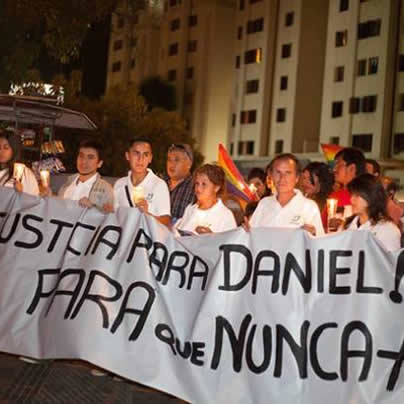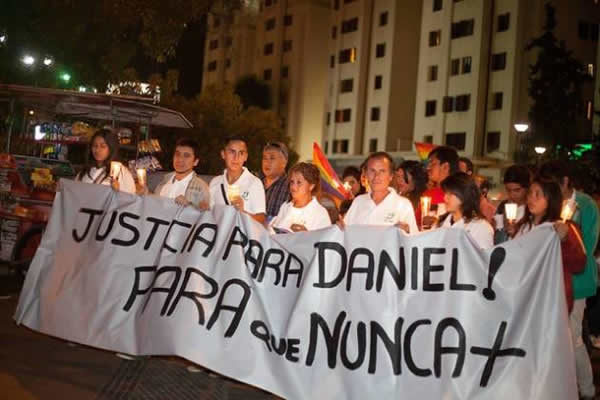News
Trial of gay Chilean’s alleged killers begins
Four neo-Nazis beat Daniel Zamudio to death in March 2012


Daniel Zamudio’s death in March 2012 sparked outrage across Chile and prompted lawmakers to pass a hate crimes and anti-discrimination bill. (Photos courtesy of Fundación Daniel Zamudio.)
The trial of four men who are accused of beating a gay man to death in the Chilean capital last year began on Monday.
Prosecutors contend Patricio Ahumada Garay and three other self-described neo-Nazis — Raúl López Fuentes, Alejandro Angulo Tapia and Fabián Mora Mora — attacked Daniel Zamudio in a Santiago park on March 3, 2012, because he was gay. Authorities allege the four men attacked Zamudio with bottles and other blunt objects before they cut off part of his ear, carved swastikas into his chest and burned other parts of his body with cigarettes.
Zamudio died in a Santiago hospital more than three weeks after the attack.
Crime was ‘point of inflection’ for Chilean lawmakers, society
Zamudio’s death sparked widespread outrage across Chile.
President Sebastián Piñera in July 2012 signed a hate crimes and anti-discrimination bill that includes both sexual orientation and gender identity and expression that had languished in the South American country’s Congress for seven years. Jaime Parada Hoyl of the Chilean LGBT advocacy group Movement for Homosexual Integration and Liberation (Movilh,) who last November became the first openly gay political candidate elected in the country when he won a seat on the municipal council in the Providencia section of Santiago, said Zamudio’s death prompted lawmakers and Chilean society to address homophobia and transphobia.
“This case was an earthquake of a loss of a human life, but it was a point of inflection,” Parada told the Washington Blade during an interview in D.C. last September.
Advocates remain concerned about anti-LGBT violence in Chile in spite of the law named in honor of Zamudio.
Six men reportedly used homophobic slurs as they attacked Esteban Navarro Quinchevil with knives, machetes and iron bars at a suburban Santiago soccer field in June. A transgender teenager from the coastal city of Cartagena in May lost an eye during an alleged anti-trans attack.
Piñera’s spokesperson, Cecilia Pérez, met with Navarro’s parents and the trans teenager at the presidential palace in Santiago in July.
Ahumada, whom prosecutors say masterminded the attack against Zamudio, could face life in prison if convicted. López, who reportedly confessed to the crime, and Angulo and Mora each face a sentence of up to 20 years.
“We are hoping for the maximum punishment for each of those responsible for the murder of Daniel Zamudio, who after being tortured on March 3, 2012, lost his life,” Movilh said in a statement on Sunday.
Movilh added it and the group’s lawyers who are representing Zamudio’s family feel the case is historic because the result “will clearly establish whether how far the justice system and the courts have advanced or not around the principle of non-discrimination and equality for sexual minorities.” Parada told the Blade on Sunday the trial is expected to last roughly 20 days.
“Daniel Zamudio left us a big legacy: the Zamudio law and a better social sensibility towards diversity,” Movilh said. “Our society and country are still in debt to him. The debt will only be repaid with full and total justice.”
Kansas
ACLU sues Kansas over law invalidating trans residents’ IDs
A new Kansas bill requires transgender residents to have their driver’s licenses reflect their sex assigned at birth, invalidating current licenses.

Transgender people across Kansas received letters in the mail on Wednesday demanding the immediate surrender of their driver’s licenses following passage of one of the harshest transgender bathroom bans in the nation. Now the American Civil Liberties Union is filing a lawsuit to block the ban and protect transgender residents from what advocates describe as “sweeping” and “punitive” consequences.
Independent journalist Erin Reed broke the story Wednesday after lawmakers approved House Substitute for Senate Bill 244. In her reporting, Reed included a photo of the letter sent to transgender Kansans, requiring them to obtain a driver’s license that reflects their sex assigned at birth rather than the gender with which they identify.
According to the reporting, transgender Kansans must surrender their driver’s licenses and that their current credentials — regardless of expiration date — will be considered invalid upon the law’s publication. The move effectively nullifies previously issued identification documents, creating immediate uncertainty for those impacted.
House Substitute for Senate Bill 244 also stipulates that any transgender person caught driving without a valid license could face a class B misdemeanor, punishable by up to six months in jail and a $1,000 fine. That potential penalty adds a criminal dimension to what began as an administrative action. It also compounds the legal risks for transgender Kansans, as the state already requires county jails to house inmates according to sex assigned at birth — a policy that advocates say can place transgender detainees at heightened risk.
Beyond identification issues, SB 244 not only bans transgender people from using restrooms that match their gender identity in government buildings — including libraries, courthouses, state parks, hospitals, and interstate rest stops — with the possibility for criminal penalties, but also allows for what critics have described as a “bathroom bounty hunter” provision. The measure permits anyone who encounters a transgender person in a restroom — including potentially in private businesses — to sue them for large sums of money, dramatically expanding the scope of enforcement beyond government authorities.
The lawsuit challenging SB 244 was filed today in the District Court of Douglas County on behalf of anonymous plaintiffs Daniel Doe and Matthew Moe by the American Civil Liberties Union, the ACLU of Kansas, and Ballard Spahr LLP. The complaint argues that SB 244 violates the Kansas Constitution’s protections for personal autonomy, privacy, equality under the law, due process, and freedom of speech.
Additionally, the American Civil Liberties Union filed a temporary restraining order on behalf of the anonymous plaintiffs, arguing that the order — followed by a temporary injunction — is necessary to prevent the “irreparable harm” that would result from SB 244.
State Rep. Abi Boatman, a Wichita Democrat and the only transgender member of the Kansas Legislature, told the Kansas City Star on Wednesday that “persecution is the point.”
“This legislation is a direct attack on the dignity and humanity of transgender Kansans,” said Monica Bennett, legal director of the ACLU of Kansas. “It undermines our state’s strong constitutional protections against government overreach and persecution.”
“SB 244 is a cruel and craven threat to public safety all in the name of fostering fear, division, and paranoia,” said Harper Seldin, senior staff attorney for the ACLU’s LGBTQ & HIV Rights Project. “The invalidation of state-issued IDs threatens to out transgender people against their will every time they apply for a job, rent an apartment, or interact with police. Taken as a whole, SB 244 is a transparent attempt to deny transgender people autonomy over their own identities and push them out of public life altogether.”
“SB 244 presents a state-sanctioned attack on transgender people aimed at silencing, dehumanizing, and alienating Kansans whose gender identity does not conform to the state legislature’s preferences,” said Heather St. Clair, a Ballard Spahr litigator working on the case. “Ballard Spahr is committed to standing with the ACLU and the plaintiffs in fighting on behalf of transgender Kansans for a remedy against the injustices presented by SB 244, and is dedicated to protecting the constitutional rights jeopardized by this new law.”
National
After layoffs at Advocate, parent company acquires ‘Them’ from Conde Nast
Top editorial staff let go last week

Former staff members at the Advocate and Out magazines revealed that parent company Equalpride laid off a number of employees late last week.
Those let go included Advocate editor-in-chief Alex Cooper, Pride.com editor-in-chief Rachel Shatto, brand partnerships manager Erin Manley, community editor Marie-Adélina de la Ferriére, and Out magazine staff writers Moises Mendez and Bernardo Sim, according to a report in Hollywood Reporter.
Cooper, who joined the company in 2021, posted to social media that, “Few people have had the privilege of leading this legendary LGBTQ+ news outlet, and I’m deeply honored to have been one of them. To my team: thank you for the last four years. You’ve been the best. For those also affected today, please let me know how I can support you.”
The Advocate’s PR firm when reached by the Blade said it no longer represents the company. Emails to the Advocate went unanswered.
Equalpride on Friday announced it acquired “Them,” a digital LGBTQ outlet founded in 2017 by Conde Nast.
“Equalpride exists to elevate, celebrate and protect LGBTQ+ storytelling at scale,” Equalpride CEO Mark Berryhill said according to Hollywood Reporter. “By combining the strengths of our brands with this respected digital platform, we’re creating a unified ecosystem that delivers even more impact for our audiences, advertisers, and community partners.”
It’s not clear if “Them” staff would take over editorial responsibilities for the Advocate and Out.

In an official statement released at the reveal event Capital Pride Alliance described its just announced 2026 Pride theme of “Exist, Resist, Have the Audacity” as a “bold declaration affirming the presence, resilience, and courage of LGBTQ+ people around the world.”
The statement adds, “Grounded in the undeniable truth that our existence is not up for debate, this year’s theme calls on the community to live loudly and proudly, stand firm against injustice and erasure, and embody the collective strength that has always defined the LGBTQ+ community.”
In a reference to the impact of the hostile political climate, the statement says, “In a time when LGBTQ+ rights and history continue to face challenges, especially in our Nation’s Capital, where policy and public discourse shape the future of our country, together, we must ensure that our voices are visible, heard, and unapologetically centered.”
The statement also quotes Capital Pride Alliance CEO and President Ryan Bos’s message at the Reveal event: “This year’s theme is both a declaration and a demand,” Bos said. “Exist, Resist, Have Audacity! reflects the resilience of our community and our responsibility to protect the progress we’ve made. As we look toward our nation’s 250th anniversary, we affirm that LGBTQ+ people have always been and always will be part of the United States’s history, and we will continue shaping its future with strength and resolve,” he concluded.
-

 Mexico5 days ago
Mexico5 days agoUS Embassy in Mexico issues shelter in place order for Puerto Vallarta
-

 Netherlands4 days ago
Netherlands4 days agoRob Jetten becomes first gay Dutch prime minister
-

 Sports4 days ago
Sports4 days agoMore than a dozen LGBTQ athletes medal at Olympics
-

 Books3 days ago
Books3 days agoNew book profiles LGBTQ Ukrainians, documents war experiences

















